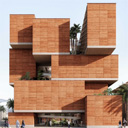0312 The Making of (Post)Colonial World's Fairs
Coping with the Duress of the Past in Today's Representational Work
Identifiers (Article)
Abstract
This article explores the agency of (post)colonial professional self-positioning through globalised forms of representational work. It deepens our understanding of the constraints and duress from the colonial past involved in the making of (post)colonial world’s fairs by analysing representational work related to the Moroccan contribution to Expo 2000. It shifts the perspective from the aesthetics of Expo contributions to the process of making aesthetic objects for such a world’s fair. Stressing the specific limited and intensified temporality of representational work in the historical context of world’s fairs allows for insights into the aspirations of those who are engaged in this mode of project work. Taking an ethnographic perspective onto the working context in the Moroccan Expo office, I will show how the daily practice allowed for a certain 'neverthelessness' when facing the duress of the colonial past, as described by Laura Ann Stoler (2016). Finally, the Moroccan contribution to Expo 2000 will be briefly discussed with respect to later and as yet unrealised pavilions.
Statistics


License

This work is licensed under a Creative Commons Attribution-NonCommercial-NoDerivatives 4.0 International License.



